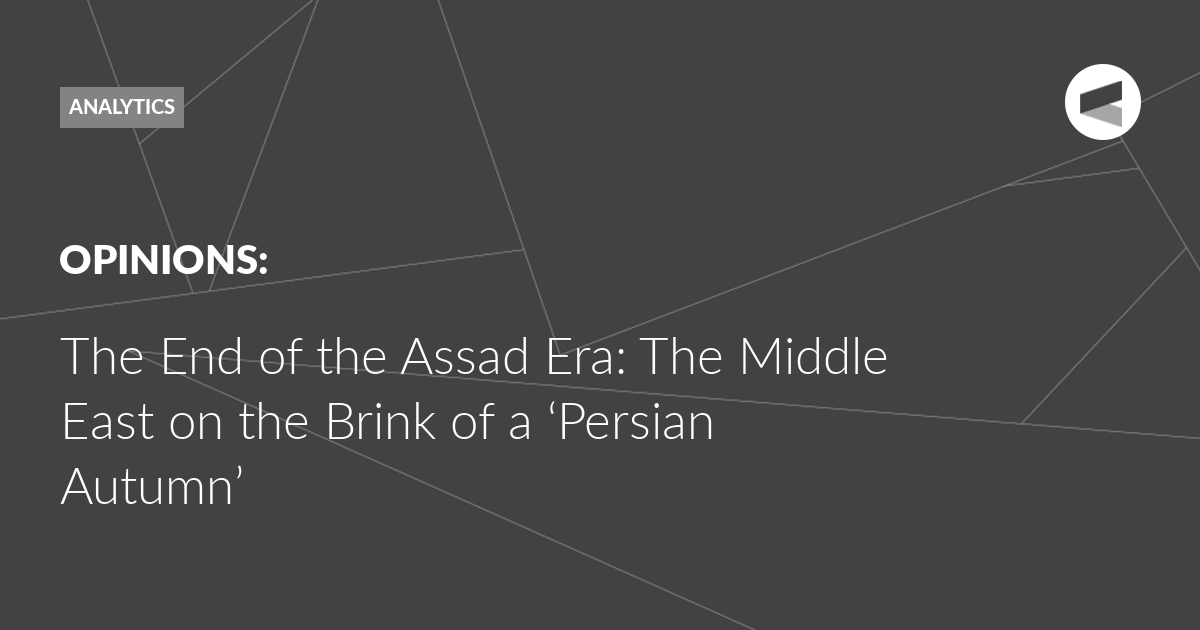What caused the fall of the Assad government?
The fall of Bashar al-Assad’s government and the opposition’s rise to power were the result of many years of internal and external contradictions that had intertwined into a complex knot, leading to devastating consequences for Syria. These events cannot be called sudden or unexpected. They were the logical outcome of deep-seated processes that had been tearing the country apart for years and gradually eroding the foundations of its political system. Bashar al-Assad, having taken office as president in 2000, inherited a state with enormous potential, but also with no less significant internal problems. The authoritarian model of governance built by his father, Hafez al-Assad, ensured stability, but did not allow the system to adapt to new challenges. Growing discontent among the population, caused by economic stagnation, inequality, corruption and a lack of social prospects, became the foundation for the gap between the government and society. Instead of reforms and compromise, the government chose the path of suppression and militarised the conflict, which further deepened the crisis. However, the internal problems were only aggravated by the influence of external forces. The Syrian crisis quickly turned into an arena of geopolitical struggle, with each side pursuing its own interests. Western countries and Arab monarchies openly supported the opposition, seeking to weaken the Assad government and undermine the influence of its allies, Russia and Iran. Turkey, Saudi Arabia and Israel also saw Syria as an opportunity to strengthen their positions in the region, which was expressed in economic, military and political support for the opposition forces. At the same time, Russia and Iran, playing the role of key allies of Damascus, sought to maintain Assad’s power and stabilise the situation in the country, viewing Syria as an important element of their influence in the Middle East.
The events of October 7, 2023 had a significant impact on the situation in Syria, aggravating the crisis. Israeli strikes seriously damaged Iranian influence in the region and particularly weakened Hezbollah, which was a key military ally of Bashar al-Assad’s government. The loss of Hezbollah and the reduction of Iranian support deprived the Syrian government of important resources in the fight against the armed opposition. This allowed the opposition forces to become more active, which led to the loss of Aleppo, Homs and the encirclement of Damascus.
Syria also fell victim to the chaos brought about by terrorist groups that took advantage of the weakness of the central government. Militants acting without rules not only exacerbated the crisis, but also discredited the very idea of political dialogue. In such conditions, the Assad government was unable to cope with the challenges, and attempts to remain in power by force only accelerated the process of destabilisation. An important factor was the decline in trust in the regime on the part of those who had recently supported it. Economic difficulties, rising prices, shortages of basic goods and constant hostilities made life unbearable for the population. Years of sanctions and an economic blockade had deprived the leadership of room for manoeuvre, and the lack of reforms convinced many that change was necessary, even if it brought destruction.
Bashar al-Assad found himself in a difficult position as a political figure. His initial reluctance to become the country’s leader, his upbringing in a household dominated by his older brother Basil, and his lack of political ambitions left him vulnerable to challenges. After Basil’s death, Assad was forced to take over as heir, but his secular education in London and lack of experience in governing the country made him more of a symbol of the system than its real architect. Over the years, accumulated problems and personal tragedies, such as the illness of his wife Asma, sapped his energy and may have affected his willingness to change. Assad ultimately found himself trapped in a system that could no longer provide stability or prospects for development.
Winners and losers
The fall of Damascus was a turning point in Middle Eastern politics, marking not only the collapse of Bashar al-Assad’s rule, but also a radical redistribution of power in the region. One of the key consequences of this event was the strengthening of Turkey and Israel, which, taking advantage of the weakening of Syria and its allies, significantly expanded their influence.
Turkey, which had long sought to strengthen its position in Syria, perceived the fall of the Assad regime as an opportunity to increase its influence on the Syrian opposition and Kurdish territories. Ankara, which was already actively involved in the Syrian conflict through its support for armed groups, tried to present itself as a key player contributing to the success of the opposition. The Turkish leadership not only strengthened its position in northern Syria, but also increased pressure on the Kurdish forces, which Ankara traditionally views as a threat to its security. Taking advantage of the chaos caused by the fall of Damascus, Turkey continued to expand its military presence, strengthening its control over the border areas. Ankara also sought to legitimise its actions in the eyes of the international community, emphasising the need for “stabilisation” and the fight against Kurdish terrorism. However, its actions were controversial, as coordination with rebel forces and active participation in regime change raised questions about compliance with international law.
In turn, Israel also took advantage of the weakening of Syria to realise its strategic goals. The fall of Damascus allowed the Israeli army to significantly expand its occupation of Syrian territory, particularly in the buffer zone of the Golan Heights. Israel strengthened its presence in this region, which not only strengthened its strategic position, but also significantly limited the ability of Syria and Iran to counter it. Moreover, Israel’s air force and navy carried out numerous strikes on Syrian bases, ports and infrastructure facilities, which practically eliminated Syria’s military potential. Bases with equipment, weapons depots and even ships in key ports such as Latakia and Tartus were destroyed. These actions dealt a crushing blow to the remnants of the Syrian army, completely undermining its ability to conduct any large-scale military operations.
For Israel, this was a strategic success, since the weakening of Syria and Iran allowed it to strengthen its security and expand its control over the region. The strikes on bases and ports also sent a clear signal to other countries in the region that Israel was ready to actively defend its interests and would not allow the restoration of Syria’s military potential.
The United States and its allies initially advocated ousting the Bashar al-Assad regime, seeing this as a step toward weakening the influence of Iran and Russia in the Middle East. The Western strategy included economic pressure in the form of sanctions, the diplomatic isolation of Damascus, and support for the Syrian opposition. In addition, Washington and its allies actively coordinated the actions of armed groups, providing them with military and financial assistance. Although these efforts were officially presented as fighting terrorism and promoting democracy, in reality they contributed to the destabilisation of Syria and the undermining of its state apparatus.
Under the guise of fighting the Assad government, the United States has increased its military presence in eastern Syria, focusing on areas with oil fields, such as Deir ez-Zor. Under the pretext of fighting the remnants of terrorist groups, American troops have established control over these strategically important territories, depriving the Syrian government of access to one of its main sources of income. This move not only weakened the Syrian economy, but also allowed the United States to strengthen its position in the region.
Western countries also played an important role in the information war, shaping international public opinion. The media actively supported the narrative of the need for a change of power in Syria, focusing on the human rights violations of the Assad regime. Interviews with rebel leaders, such as the head of the armed opposition Ahmed al-Sharaa, who was the head of the terrorist group HTS (banned in Russia by court order) for a long time, on Western channels, including CNN, clearly demonstrated the West’s willingness to use such forces as a tool in the struggle for influence in the region, despite their terrorist status.
The fall of Damascus was a turning point for Middle Eastern politics, symbolizing not only the collapse of Bashar al-Assad’s rule, but also a significant weakening of Iranian influence, which had determined the strategic architecture of the region for many years. For Tehran, Syria was not just an ally, but a key element of the “axis of resistance” to Israel, which also includes Lebanon, Yemen, and Palestinian groups. Syria played the role of a logistical hub for supplying Hezbollah with weapons as well as political and economic support. However, the fall of the capital and the chaos in the country destroyed these routes, leaving Iran without a significant part of its regional infrastructure. Taking advantage of the situation, Israel strengthened its position by expanding its occupation in the buffer zone of the Golan Heights, which further limited Iran’s influence in the region.
The losses of Hezbollah were a particularly painful blow for Tehran. The Lebanese organisation, which had long been considered Iran’s main tool in the confrontation with Israel, found itself isolated. The destruction of logistical chains and the loss of arms supplies called its combat effectiveness into question. For Tehran, this is not only a weakening of its influence in Lebanon, but also a serious test for its entire Middle East strategy. In the context of the loss of Syria, Iran was forced to reshape its foreign policy plans, which only exacerbates internal contradictions in the Islamic Republic.
Disappointment in Damascus was also reflected in official Iranian rhetoric. Pars Today accused Assad of being unable to maintain control over the situation, emphasising that his weakness and lack of ideological firmness were the cause of the collapse. These words reflect the deep frustration of the Iranian leadership, which is aware of the scale of the losses.
The Valdai Discussion Club was established in 2004. It is named after Lake Valdai, which is located close to Veliky Novgorod, where the Club’s first meeting took place.
Please visit the firm link to site






